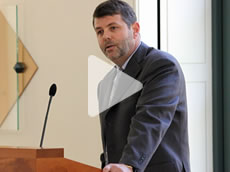Cushman: Constitutional Debate Over Convict Labor Shows Tensions in Free Labor Ideology
Political leaders and the judiciary in the late 19th and early 20th centuries struggled to determine the constitutional implications of antislavery, “free labor” ideology, Professor Barry Cushman said Wednesday during a lecture marking his appointment as James Monroe Distinguished Professor of Law.
 That debate played out through a series of laws and court decisions that touched on the 14th Amendment’s due process and equal protection clauses, as well as the Constitution’s commerce clause, which gives Congress the right to regulate interstate commerce.
That debate played out through a series of laws and court decisions that touched on the 14th Amendment’s due process and equal protection clauses, as well as the Constitution’s commerce clause, which gives Congress the right to regulate interstate commerce.
Cushman, who is writing a book about the use of commerce power to address a series of social problems during the Progressive Era, said that cases involving the regulation of goods made by convict labor were at the center of this debate.
“Throughout the 19th century, organized workers agitated for the reform of the system of convict labor, contending that goods manufactured with cheap prison labor competed unfairly with goods produced in the private economy and thereby depressed wages,” Cushman said. “They viewed convict labor as a species of slave labor that threatened to degrade free laborers, impeding their capacity to acquire capital and to enjoy the upward social mobility that free labor ideology promised to industrious, disciplined workmen.”
New York state became a national leader in reform efforts. Starting in the late 19th century, the state legislature abolished various forms of convict labor and prohibited the sale of goods manufactured in its prisons on the private market.
Over the next few decades the state also enacted various laws to limit the sale of convict-made goods produced in other states, from requiring such goods to be labeled to taxing sellers of such goods by requiring them to buy a license. These laws were challenged in the state’s courts.
“The question presented under the 14th Amendment was whether New York’s efforts to protect its free laborers deprived the owner and seller of convict-made goods of property rights without due process or denied him equal protection of the laws,” Cushman said.
In the late 19th and early 20th centuries, a number of New York judges maintained that such laws were unconstitutional. By the 1930s, however, the New York bench came to see the protection of free laborers as a legitimate reason to prohibit all sales of convict-made products.
The U.S. Supreme Court agreed. In 1936 the Justices unanimously upheld the federal Hawes-Cooper Act, which allowed states to prohibit the sale of goods made in out-of-state prisons, and an Ohio statute prohibiting open-market sale of convict-made goods.
The following year a unanimous Supreme Court upheld the federal Ashurst-Sumners Act, which prohibited interstate shipment of convict-made goods into states in which their sale was illegal under local law. By the end of 1937, only 10 states allowed the unrestricted sale of convict-made goods.
“The story of convict labor reform in New York reminds us that the 14th Amendment’s ambiguous protections of liberty and property also left open how many questions of law and policy would be resolved within the system of industrial capitalism,” Cushman said.
“For a season, [free labor] ideology was a powerful force underwriting constitutional restrictions on government’s regulatory competence,” he said. “But all the while that rich and multivalent constellation of ideas also supplied a reservoir of state authority to order our economic relations, and that may well be its more enduring legacy.”
Founded in 1819, the University of Virginia School of Law is the second-oldest continuously operating law school in the nation. Consistently ranked among the top law schools, Virginia is a world-renowned training ground for distinguished lawyers and public servants, instilling in them a commitment to leadership, integrity and community service.


